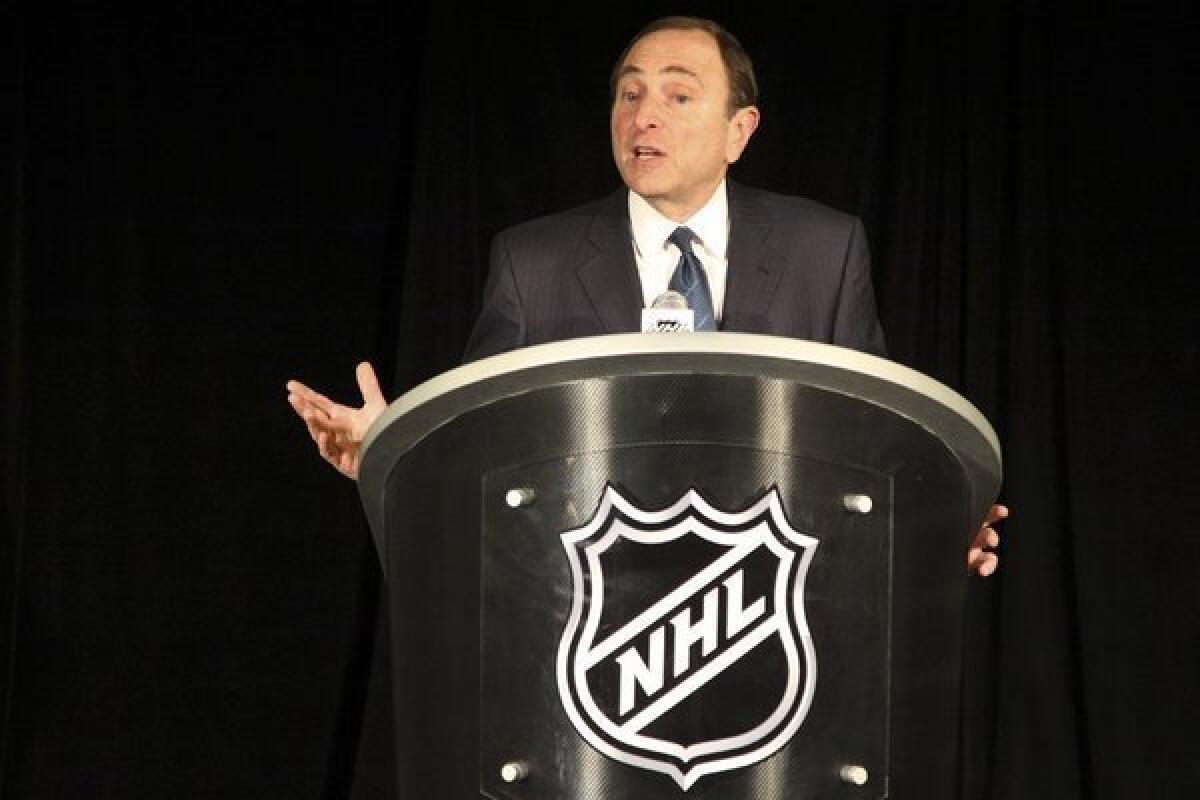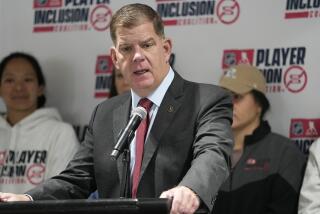Gary Bettman remains a stern guy in labor talks

- Share via
When Gary Bettman becomes irate, spots of color bloom near his cheekbones and his body vibrates like a taut wire. And rarely has the NHL commissioner appeared as angry as he was on Dec. 6, after the league broke off collective bargaining talks with the players’ association and he was asked how he feels about presiding over his third lockout in 20 years.
“It’s absolutely something that torments me,” he said, biting off the words as his complexion took on the reddish color of his tie.
Yet, most fans and players don’t believe he’s troubled by the discord that has postponed the start of the 2012-13 season at least through Dec. 30. Nor do they trust him and his strategy.
They’ve read the NHL’s news releases about revenues reaching a record $3.3 billion last season and wonder how the league can be in such peril now. The last lockout was defensible because of league-wide losses, and although Bettman became the first commissioner of a major North American sport to cancel a season over a labor dispute, he won major concessions. The players’ union splintered and Bettman got an economic overhaul anchored by a salary cap in addition to fan-friendly changes on the ice.
This dispute feels different. Some teams are making piles of money and many have signed players to contracts that are double-digit-years in length and triple-digit-millions in payout. But Bettman sees costs rising and fears for the mid- and small-market teams, and he feels obliged to protect them.
Owners deemed it insupportable when players’ salaries last season consumed 57% of hockey-related revenues, money contractually defined to be shared. After making a severe initial offer that seemed only to rally players around NHL Players’ Assn. leader Donald Fehr, Bettman locked players out Sept. 15. “We believe we’re paying out too much,” he said.
How much is too much? Whatever the owners say it is.
Bettman works for them, and they’ve shown their approval of him by extending his contract and paying him nearly $8 million in salary and benefits for the fiscal year that ended June 30, 2011. Some big-market clubs have pressured him to forge a deal and start an abbreviated season, but he’s holding firm on three issues: a 10-year collective bargaining agreement (with an opt-out after eight years); a five-year maximum for players’ contracts except teams can re-sign free agents for seven years, and no buyouts as the next labor deal is phased in.
“It certainly appears as an observer of these things that the league is taking a very strong-willed approach in these negotiations, and I suppose folks shouldn’t be too surprised because of the similar approach in the labor stoppage the NHL had in 2004,” said Seth Borden, a labor lawyer and partner at the New York office of McKenna Long & Aldridge who said he’s a sports fan but doesn’t know Bettman personally.
The deal that ended the 2004-05 dispute, initially considered a win for the NHL, was undermined when owners doled out long, front-loaded contracts that minimized salary-cap hits. This time, Bettman is intent on closing all loopholes and saving the owners from themselves. He already gave them a huge victory when players accepted a 50-50 split of hockey-related revenues throughout the next agreement.
“He’s got his marching orders. He knows what he wants to achieve on behalf of his folks,” Borden said. “He has taken a very aggressive approach in trying to achieve those objectives.”
Bettman, 60, inarguably excels at the business of hockey.
“He’s brilliant. He’s mastered the breadth of the industry, and it’s a broad industry, with lots of detail,” said Toronto Maple Leafs General Manager Brian Burke, who was Bettman’s top hockey deputy from 1993 to ’98.
“He communicates wonderfully with the owners. That’s a big part of his job. He’s probably on the phone with 10 different owners every day. He was very fair when I worked for him. A born teacher.”
But the knowledge and assurance that make Bettman an effective businessman make him an unsympathetic figure to players, fans and those who have emotional investments in the game.
Owners can be reclusive, but Bettman is out front and an easy target. A New Jersey resident who speaks with the accent of his native Queens, Bettman isn’t warm and fuzzy. He’s sharply intelligent and can come off as cold. Some Canadians resent that he didn’t learn the game in Moose Jaw or Toronto and insist he can’t have the good of their game at heart.
Bettman declined an interview with The Times, saying he didn’t want his comments to affect the labor talks. Those who know him say he has a human side and has been wronged in the court of public opinion.
“I wish Gary was perceived more fairly than he is in Canada because he’s a great guy, a brilliant guy, and he’s really been good for our league,” Burke said. “You have to look at the metrics of this league from when Gary took over to where we are now, and he’s been a marvelous commissioner.”
Jonathon Gatehouse, a senior correspondent for Canada’s Maclean’s magazine, set out to write a book to coincide with the 20th anniversary of Bettman’s 1993 ascent. “The Instigator: How Gary Bettman Remade the NHL and Changed the Game Forever,” is an unauthorized biography, but Gatehouse had access to Bettman and the commissioner’s current and former colleagues.
“I think he’s a far more complex figure than the sort of cartoon that exists in the minds of most fans,” Gatehouse said. “He knows a lot more about the game than people generally give him credit for.
“I think what’s problematic about him is what you’re seeing right now, that as a commissioner you can talk about the good of the game and concepts like that, but in the end it’s a business and he’s there to maximize profits for owners. That’s what he’s there for and that’s what he’s good at.”
Bettman got his formal education at Cornell University and New York University law school. His education accelerated when he worked alongside NBA Commissioner David Stern, a fellow alumnus of the New York law firm Proskauer Rose who knew of him through their mutual mentor, George Gallantz. Stern hired Bettman to be the NBA’s assistant general counsel, and in that role Bettman codified the complex salary cap while following Stern’s hard-nosed lead in labor talks.
“As a negotiator I’m much gentler and easier than Gary — but put that in quotes so nobody misunderstands. ‘Said with a chuckle,’” Stern said, supplying his own punctuation during a phone interview.
Bettman was on the NHL’s radar after John Ziegler was forced out as the league’s president in 1992. Then-Kings owner Bruce McNall, leading the search, targeted Stern and Stern’s deputy, Russ Granik. After both declined, the NHL chose Bettman over self-promoting Gil Stein to become its first commissioner.
The fit seemed good. After 12 years at the NBA Bettman was only 40. Best of all, Bettman, who stands about 5 feet 7, seemed to have a sense of humor.
“I don’t think I have to be a hockey guy,” he said at his first news conference. “I wasn’t hired to be a general manager. I certainly wasn’t hired to be a coach. And certainly not as a player.”
NHL executives liked Bettman’s experience with the NBA’s salary cap because they wanted one too. He didn’t get it in his first labor conflict, which shortened the 1994-95 season to 48 games, but he made good use of the expertise he had gained while handling the NBA’s legal, entertainment, licensing, TV and international matters.
“There was no area he didn’t work on with Russ and me,” said Stern, who socializes often with Bettman. “The three of us would just sort of finish each other’s sentences and worked very hard to do it. Gary was incapable of being overloaded by work. He was indefatigable and always happy to take on new responsibilities.”
Bettman, installed on Feb. 1, 1993, inherited a league that had annual revenues of $400 million and little national TV presence. Recruiting and supervising a staff that generated innovations in marketing, online ventures and events such as the Winter Classic, Bettman helped the NHL attract an impressive array of corporate sponsors.
He negotiated TV deals with Fox for five years at $155 million and later a five-year, $600-million deal with ABC in 1998 that was renewed for two years at less money. Although the NHL split with ABC/ESPN after its lost season, the league benefited from media mergers that moved its U.S. telecasts from the little-known Outdoor Life Network to NBC/Comcast. The network agreed to a 10-year, $2-billion rights deal last year.
Gatehouse called Bettman arguably “the most powerful figure the game’s ever known” above even the Norris family, which owned several teams in the old six-team NHL.
“It’s a far different business, dollar-wise, in reach and professionalism,” Gatehouse said. “It’s a major enterprise and he has largely formed it, and he has also formed not just the game you see on the ice but how it’s marketed and how people consume it.”
Bettman has also influenced where it’s consumed.
Although expansion was in the works before he took over, he is identified with the NHL’s foray into the Sunbelt. He has been — perhaps beyond reason — a staunch supporter of the Phoenix Coyotes, who were placed in bankruptcy more than three years ago and are still being operated by the league. But he was quick to help move the Atlanta Thrashers to Winnipeg, where they enjoyed a spectacular debut last season.
His support of nontraditional cities has contributed to the venom spewed at him during this dispute. Fans have created websites, circulated petitions and manufactured T-shirts calling for Bettman’s dismissal. Others hurl profanity or make veiled threats via social media. He tries not to flinch publicly.
“He handles it as well as anyone possibly could,” Stern said. “He understands that comes with the job, as we all do….That’s why it’s important that you believe in what you’re doing and have the support of your owners and you know that’s what they expect you to do.”
Continuing his pattern, Bettman’s latest move was a bold one. Anticipating the NHLPA would take the legal path of dissolving as a union, the NHL on Friday filed a class-action complaint in federal court in New York seeking a declaration confirming that its lockout is legal. The NHL also filed an unfair labor practice charge with the National Labor Relations Board alleging the union “engaged in an unlawful subversion of the collective bargaining process and conduct that constitutes bad faith bargaining under the National Labor Relations Act.”
Still, the season isn’t necessarily lost. The National Basketball Players Assn. filed a disclaimer of interest during its dispute with the NBA last year. The sides settled soon afterward. There’s still time for a 56- or 58-game season starting in mid-January if Bettman and the owners conclude they’ve gained enough from players.
“I still suspect that the league has in its mind a break-even point financially, and if it’s not a date on a calendar or a particular number of games lost, or whatever, it’s some metric by which they know, ‘Hey, we’re about to pass the point of no return,’” said Borden, the labor lawyer.
“And again, not knowing the full ins and outs of the economics of the league, I would find it hard to believe that they’re willing to give up on an entire season. Although each week that passes makes it seem more possible, I just don’t think that is as an attractive prospect as it might have been in 2004 in order to achieve their objectives.”
twitter.com/helenenothelen
More to Read
Go beyond the scoreboard
Get the latest on L.A.'s teams in the daily Sports Report newsletter.
You may occasionally receive promotional content from the Los Angeles Times.











